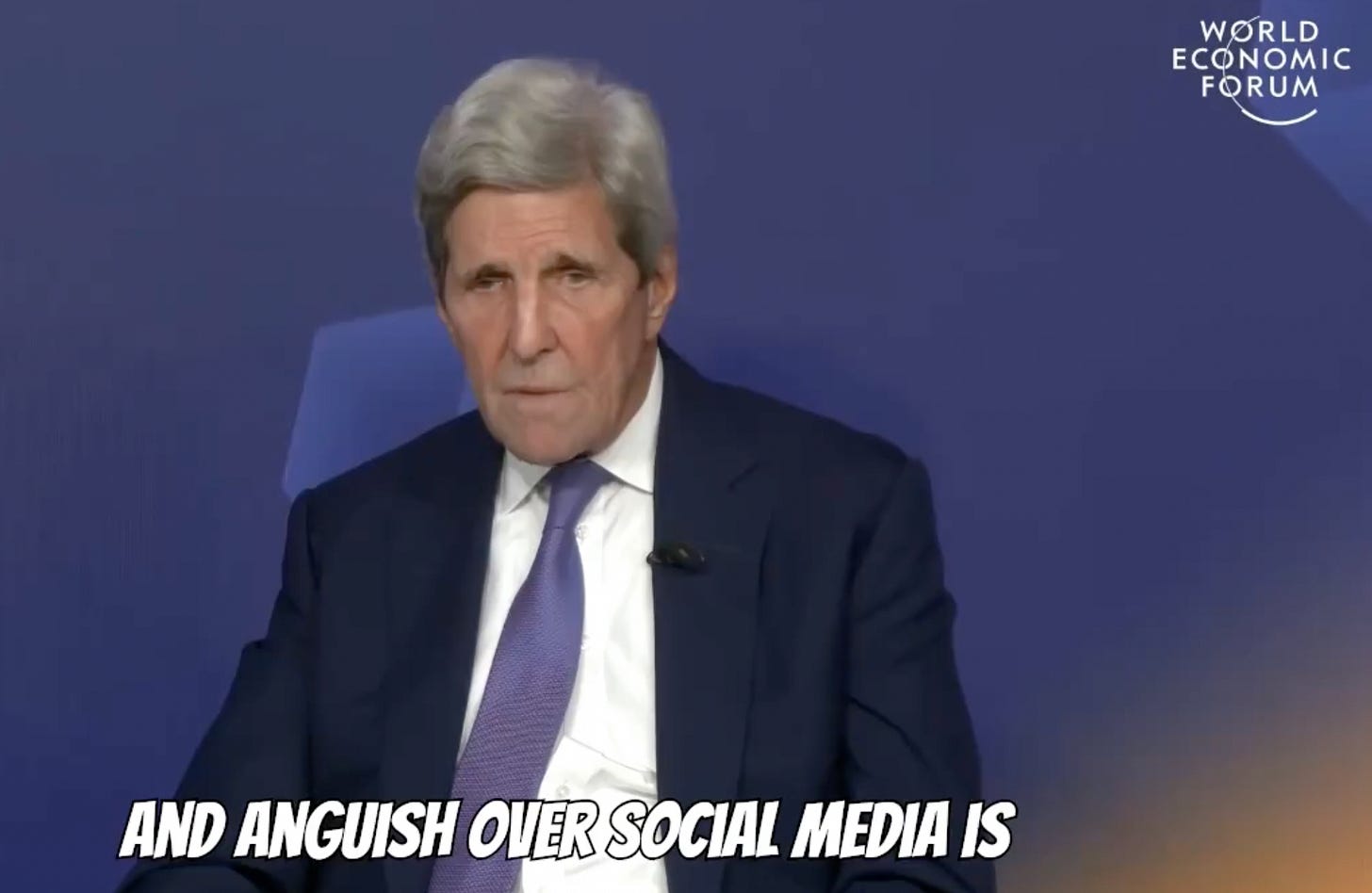As Difficult As It May Be to Believe This, John Kerry Keeps Getting Dumber and Slower and More Pathetic and Horrible
in the old days, life was very pure
John Kerry has been speaking in Davos this week, and just typing that sentence makes my bowels rumble.
Because he’s John Kerry, he said shockingly ignorant things in a tone of high pomposity, as if expecting his words to be carved in granite to be handed down through the ages. He’s the male Anne Applebaum, Idiocracy’s cosplay intellectual. You can find a bunch of clips from his idiotic WEF panel discussion on Twitter, but you can find a full record of his banality, with video, here. The First Amendment, Kerry warns, has become deeply harmful to democracy, because social media lets the peasantry choose their own sources of information:
I think the the dislike of and anguish over social media is just growing and growing and growing. And that's part of our problem, particularly in democracies in terms of building consensus around any issue. It's really hard to govern today. You can't you know, there's no referees. We used to have to determine what's a fact and what isn't. In fact, that kind of, you know, been eviscerated to a certain degree. And people go and people self-select where they go for their news or for their information. And then you just get into a vicious cycle.
So it's really, really hard, much harder to build consensus today than at any time in the 45, 50 years I've been involved in this. And and, you know, there's a lot of discussion now about how you curb those entities in order to guarantee that you're going to have, you know, some accountability on facts, etc.. But look, if people go to only one source and the source they go to is sick and, you know, has an agenda and they're putting out disinformation, our First Amendment stands as a major block to the ability to be able to just, you know, hammered out of existence.
In the old days, we had referees. The news media existed simply to determine truth, with complete neutrality, building consensus on a hard bed of undisputed fact. But now, because of social media, people can choose what they read, and some of what they read is false, so consensus is breaking down. And so the First Amendment is a major block to our ability to hammer falsehood out of existence, you see.
This will be roughly the trillionth time I’ve said this — here’s an example — but let’s do it again for the slow kids on the stage in Davos:
Walter Duranty won the Pulitzer Prize for telling readers there was no famine in Stalin-era Ukraine. There’s your referees who built consensus through pure truth, you idiot.
In the 1980s, the local news media in Los Angeles broke the astonishing news that a gang of Satan-worshipping pedophiles was raping toddlers at a pre-school in Manhattan Beach. They tortured animals to death in front of the children to terrify them into silence, and the schoolyard was full of the remains of the dead animals, which the police would…uh…dig up and…okay, so they didn’t find the dead animals, but trust us, huge Satanic sex abuse ring. Reviewing the hysteria as it died away, Los Angeles Times media critic David Shaw noted that, among many other things, newspapers had breathlessly reported on the HUGE RAIDS mounted by law enforcement to seize evidence of the SATANIC PEDOPHILES, but omitted the detail that the raids…didn’t turn up any evidence.
In the old days, you see, back when journalists were completely neutral referees who just relentlessly spoke pure truth.
The pool of available examples is nearly infinite. The era of the penny press, the big city tabloids that famously employed “sob sisters” to tell dramatic stories of despair and poverty and widows and orphans and sexy murders, was the age of the Lifetime movie-of-the-week in print form. New York City had, at peak, something like sixteen daily newspapers, each with its own niche and audience: the crusading afternoon tabloid for the working man, the high-toned morning daily that served as the sober-voiced newsletter of officialdom, and so on.
Public quiz for John Kerry: What does the term “yellow journalism” refer to, and in what era was it first used? How about the term “muckraker,” or the term “hack,” where do those come from? Is it social media? Why does a glossary of historical journalism lingo include old terms like “hatchet job,” say for example?
Thomas Jefferson, 1807:
It is a melancholy truth, that a suppression of the press could not more compleatly deprive the nation of its benefits, than is done by its abandoned prostitution to falsehood. Nothing can now be believed which is seen in a newspaper. Truth itself becomes suspicious by being put into that polluted vehicle.
Will someone please drag the old days of the objective press that served as a referee of truth myth out behind the barn and hit it over the head with a shovel?
Killing off an old piece of worthless banality risks silencing John Kerry, who appears to possess no other form of thought, but he can live out the rest of his life in a dignified silence, and the rest of us can go back to not knowing that Davos is an actual place, amen.




If you ever get a chance to visit a historical archive and read American newspapers from the early 19th century, it's fun. They say things like, "We have just received the latest bucket of filthy untruths from the shameful den of Jacobin vipers at the Crosstown Weekly News, and pause from recoiling in horror to address their vile calumnies."
I just saw that clip and saved it for a future ridiculing article. John Kerry is one of the most insufferable people alive because he really think he's a savior and not a destroyer.